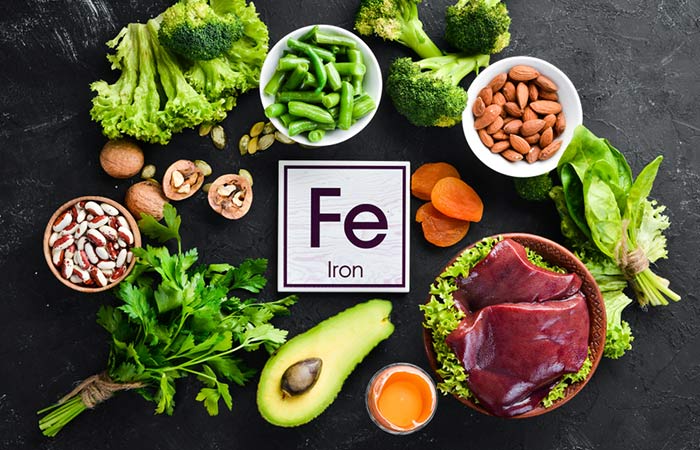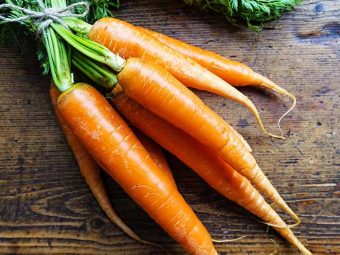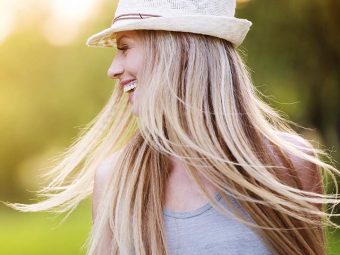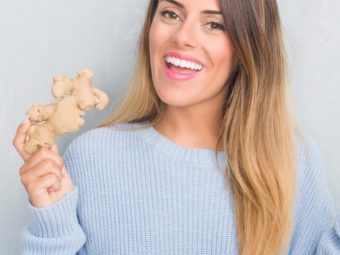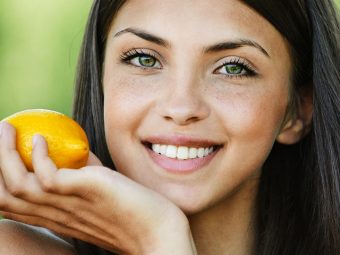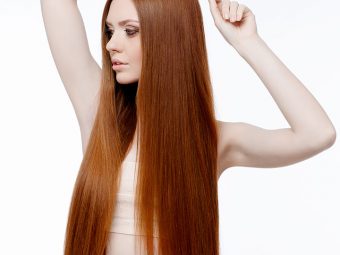Iron For Hair Growth: Benefits, Food Sources, & Side Effects
Discover how important this micronutrient is in maintaining a healthy, strong mane.
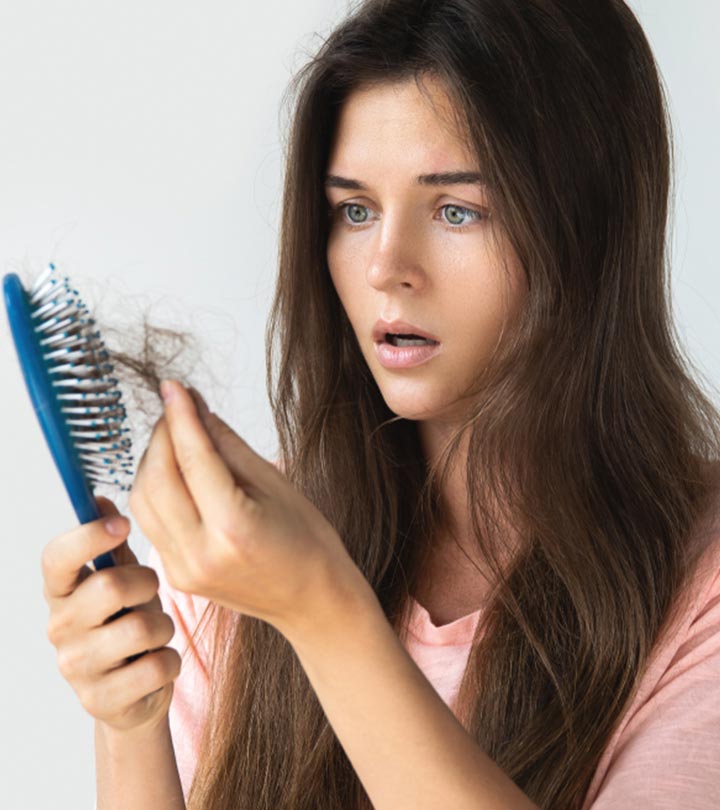
Iron deficiency anemia and hair loss develop when a person’s body does not have enough iron or cannot use iron efficiently. This is one reason most hair experts and doctors recommend ingesting iron for hair growth. Iron deficiency is the most common nutritional disorder in women (1). Menstrual blood loss, pregnancy, and gastrointestinal bleeding are causes of low iron levels (2). If the hemoglobin level falls below 10 mg/dL, it leads to iron deficiency anemia (3). This also increases the risk of excessive hair loss in women (4).
Thankfully, consuming iron-rich foods and supplements can help reverse hair loss due to iron deficiency (2). Continue reading to learn about foods rich in iron that can help prevent hair loss due to anemia. To learn more, keep scrolling!
In This Article
Iron Deficiency Anemia And Hair Loss
Iron deficiency anemia is the most common type of anemia (5). It is a condition in which the body does not produce enough RBCs (red blood cells). The RBCs contain hemoglobin (an iron-rich protein) that helps carry oxygen to the body (even to the hair roots). Optimum RBC levels help keep the body, skin, hair, and nails healthy.
However, a low RBC count can lead to low iron levels in the body. Scientists speculate that iron deficiency could be the reason for excessive hair fall in women.
A 2013 study confirms that iron deficiency plays a certain role in female pattern hair loss or androgenic alopecia in women (6). Another study showed that low iron levels in healthy women (without any underlying disease) led to diffuse telogen hair loss (7).
Clearly, iron plays a crucial role in promoting the health of hair follicles and may cause hair fall when the levels plummet. The question is, why does iron deficiency occur in the first place? Scroll down to know.
Causes Of Iron Deficiency Anemia
- Heavy menstruation
- Pregnancy
- Physical wounds
- Surgery
- Gastrointestinal diseases
- Stomach ulcers
- Vegetarian diet
- Frequent blood donations
- Colon cancer
These are the possible causes of iron deficiency anemia. People with this type of anemia show the following symptoms.
Symptoms Of Iron Deficiency Anemia
- Headache
- Dizziness
- Fatigue
- Pale and dry skin
- Fast heartbeat
- Hair loss
- Craving for ice or clay
- Smooth tongue
- Brittle nails
Get your iron levels checked to detect any deficiency. Here are the tests that your doctor may ask you to get done.
Tests To Know If You Have Iron Deficiency
Two tests have to be done. The hemoglobin concentration test helps measure the iron levels, and the serum ferritin concentration test confirms its deficiency. However, the serum ferritin levels may be high in people with inflammation and infections. In that case, erythrocyte zinc protoporphyrin concentration, serum iron concentration, transferrin concentration, and transferrin saturation must be tested to determine iron deficiency (2).
Scroll down to know the ideal iron level required for hair growth.
What Is The Ideal Iron Level For Hair Growth?
The normal serum ferritin level ranges from 10-120 ng/ml for females between 18 – 39 years of age and 12-263 ng/mL for 40 years and older (8). Serum ferritin levels equal to or below 30 ng/ml can lead to hair loss (7).
Fortunately, proper diet and supplementation can help reverse anemia hair loss. Scroll down to know which foods can increase iron levels and stop hair fall.
Foods To Increase Iron Levels
Shutterstock
Animal Sources Of Iron – Meat, poultry, and fish are rich sources of heme iron, which gets absorbed easily (9). A few more examples of the animal sources of iron are:
- Chicken
- Beef
- Ham
- Pork
- Lamb
- Turkey
- Tuna
- Mackerel
- Haddock
- Scallop
- Clams
- Shrimps
- Oysters
- Eggs
Plant Sources Of Iron – Plant sources contain non-heme iron that does not get easily absorbed (9). However, it is necessary for a balanced diet. Your body absorbs about 10% of the non-heme iron you consume from the plant sources. Here’s a list of plant-based foods rich in iron:
- Spinach
- Broccoli
- Peas
- Kale
- Sweet potatoes
- Chard
- Beet greens
- Collard greens
- String beans
- Tofu
- Tempeh
- Lentils
- Kidney beans
- Garbanzo beans
- Strawberries
- Watermelon
- Dates
- Prunes
- Figs
- Apricots
- Raisins
- Pepita (Pumpkin seed)
- Sunflower seeds
- Red rice
- Oats
- Quinoa
- Amaranth
- Cashew
- Almond
- Rye bread
- Whole wheat bread
Merely consuming foods rich in iron is not enough. You must also include foods that help in iron absorption. Foods rich in vitamins A and C enhance iron absorption. Scroll down for the list.
Foods That Help In Iron Absorption
- Vitamin A – Carrot, pumpkin, tomato, squash, black-eyed peas, salmon, herring, yogurt, cheese, pistachio, mango, apple, and fortified cereals.
- Vitamin C – Orange, tangerine, strawberries, blueberries, melons, and bell peppers.
Stock your kitchen with these foods and include them in your diet to increase iron levels in your body. However, if you are always on the go or need an extra boost of iron, your doctor may recommend taking supplements.
Iron Supplements For Hair Loss
Iron supplements help replenish the iron levels in your body. Here’s a list of iron supplements that you may take:
- Garden Of Life Vitamin Code Raw Iron
- Zahler Iron Complex
- EZ Melts Iron Dissolvable Vitamins
- Enzymatic Therapy Ultimate Iron Supplement
- New Chapter Iron Food Complex
Get the complete list here and go through the reviews before taking these supplements.
Note: Consult your doctor before taking any iron supplements.
Consuming iron through food sources or supplements help keep your hair healthy. Take a look at the benefits of iron for the hair in the following section.
Benefits Of Iron For The Hair
- Strengthens the hair follicles.
- Nourishes the hair roots.
- Thickens the hair.
- Enhances hair shine.
- Helps in rapid hair growth.
- Reduces hair loss.
But beware! Iron overloading can have ill effects on your health. Here’s what may happen if you consume too much iron.
Side Effects Of Excess Iron Consumption
Consuming too much iron through food sources or supplements can lead to iron toxicity. The symptoms are:
- Nausea
- Vomiting
- Diarrhea
- Stomach pain
- Liver damage
- Pancreas damage
- Heart issues
The importance of iron for hair growth is well known. Iron deficiency leads to hair loss and female pattern baldness in a few. Hence, correcting the deficiency with food and supplements can significantly cut down the risk of hair loss. Iron can strengthen hair follicles, improve hair shine, thicken the hair, and nourish hair roots. Foods like turkey, tuna, shrimp, eggs, chicken, beef, scallop, tofu, spinach, broccoli, lentils, dates, figs, apricots, and string beans are rich in iron. However, do not consume these foods or iron supplements in excess as they may cause negative effects too.
Frequently Asked Questions
How soon will the hair grow back?
Consuming iron rich-foods and supplements can help the hair grow back within 2-3 months.
Can iron make the hair curlier?
No, iron will not make your hair curlier.
What other treatments can I get for hair growth?
You can opt for PRP treatment. It is non-surgical, does not leave scars, and has no recovery downtime. You can also try laser hair therapy caps that use low-frequency laser for stimulating the hair follicles and inducing hair growth.
Will upping your iron intake reverse hair loss every time?
No. If your body’s iron levels are low, increasing iron intake can help reverse hair loss. However, if you have chronic hair loss, consult a doctor to diagnose any underlying issues.
Sources
Stylecraze has strict sourcing guidelines and relies on peer-reviewed studies, academic research institutions, and medical associations. We avoid using tertiary references. You can learn more about how we ensure our content is accurate and current by reading our editorial policy.
- Iron deficiency in women: assessment, causes and consequences
https://pubmed.ncbi.nlm.nih.gov/21934611/ - The diagnosis and treatment of iron deficiency and its potential relationship to hair loss
https://pubmed.ncbi.nlm.nih.gov/16635664/ - Recommendations to Prevent and Control Iron Deficiency in the United States
https://www.cdc.gov/mmwr/preview/mmwrhtml/00051880.htm - Low iron stores: a risk factor for excessive hair loss in non-menopausal women
https://pubmed.ncbi.nlm.nih.gov/17951130/ - Anemia
https://www.hematology.org/education/patients/anemia - Iron Plays a Certain Role in Patterned Hair Loss
https://www.ncbi.nlm.nih.gov/pmc/articles/PMC3678013/ - Iron status in diffuse telogen hair loss among women
https://pubmed.ncbi.nlm.nih.gov/20021982/ - Ferritin (Blood)
https://www.urmc.rochester.edu/encyclopedia/content.aspx?contenttypeid=167&contentid=ferritin_blood - Heme, an Essential Nutrient from Dietary Proteins, Critically Impacts Diverse Physiological and Pathological Processes
https://www.ncbi.nlm.nih.gov/pmc/articles/PMC3967179/
- Iron deficiency in women: assessment, causes and consequences



